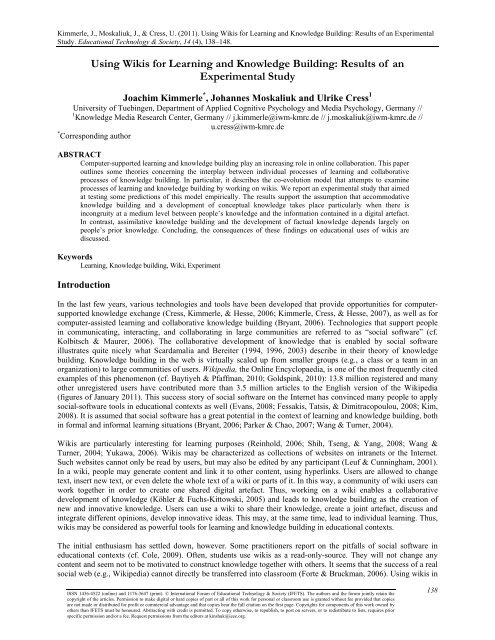October 2011 Volume 14 Number 4 - Educational Technology ...
October 2011 Volume 14 Number 4 - Educational Technology ...
October 2011 Volume 14 Number 4 - Educational Technology ...
You also want an ePaper? Increase the reach of your titles
YUMPU automatically turns print PDFs into web optimized ePapers that Google loves.
Kimmerle, J., Moskaliuk, J., & Cress, U. (<strong>2011</strong>). Using Wikis for Learning and Knowledge Building: Results of an Experimental<br />
Study. <strong>Educational</strong> <strong>Technology</strong> & Society, <strong>14</strong> (4), 138–<strong>14</strong>8.<br />
Using Wikis for Learning and Knowledge Building: Results of an<br />
Experimental Study<br />
Joachim Kimmerle * , Johannes Moskaliuk and Ulrike Cress 1<br />
University of Tuebingen, Department of Applied Cognitive Psychology and Media Psychology, Germany //<br />
1 Knowledge Media Research Center, Germany // j.kimmerle@iwm-kmrc.de // j.moskaliuk@iwm-kmrc.de //<br />
u.cress@iwm-kmrc.de<br />
* Corresponding author<br />
ABSTRACT<br />
Computer-supported learning and knowledge building play an increasing role in online collaboration. This paper<br />
outlines some theories concerning the interplay between individual processes of learning and collaborative<br />
processes of knowledge building. In particular, it describes the co-evolution model that attempts to examine<br />
processes of learning and knowledge building by working on wikis. We report an experimental study that aimed<br />
at testing some predictions of this model empirically. The results support the assumption that accommodative<br />
knowledge building and a development of conceptual knowledge takes place particularly when there is<br />
incongruity at a medium level between people’s knowledge and the information contained in a digital artefact.<br />
In contrast, assimilative knowledge building and the development of factual knowledge depends largely on<br />
people’s prior knowledge. Concluding, the consequences of these findings on educational uses of wikis are<br />
discussed.<br />
Keywords<br />
Learning, Knowledge building, Wiki, Experiment<br />
Introduction<br />
In the last few years, various technologies and tools have been developed that provide opportunities for computersupported<br />
knowledge exchange (Cress, Kimmerle, & Hesse, 2006; Kimmerle, Cress, & Hesse, 2007), as well as for<br />
computer-assisted learning and collaborative knowledge building (Bryant, 2006). Technologies that support people<br />
in communicating, interacting, and collaborating in large communities are referred to as “social software” (cf.<br />
Kolbitsch & Maurer, 2006). The collaborative development of knowledge that is enabled by social software<br />
illustrates quite nicely what Scardamalia and Bereiter (1994, 1996, 2003) describe in their theory of knowledge<br />
building. Knowledge building in the web is virtually scaled up from smaller groups (e.g., a class or a team in an<br />
organization) to large communities of users. Wikipedia, the Online Encyclopaedia, is one of the most frequently cited<br />
examples of this phenomenon (cf. Baytiyeh & Pfaffman, 2010; Goldspink, 2010): 13.8 million registered and many<br />
other unregistered users have contributed more than 3.5 million articles to the English version of the Wikipedia<br />
(figures of January <strong>2011</strong>). This success story of social software on the Internet has convinced many people to apply<br />
social-software tools in educational contexts as well (Evans, 2008; Fessakis, Tatsis, & Dimitracopoulou, 2008; Kim,<br />
2008). It is assumed that social software has a great potential in the context of learning and knowledge building, both<br />
in formal and informal learning situations (Bryant, 2006; Parker & Chao, 2007; Wang & Turner, 2004).<br />
Wikis are particularly interesting for learning purposes (Reinhold, 2006; Shih, Tseng, & Yang, 2008; Wang &<br />
Turner, 2004; Yukawa, 2006). Wikis may be characterized as collections of websites on intranets or the Internet.<br />
Such websites cannot only be read by users, but may also be edited by any participant (Leuf & Cunningham, 2001).<br />
In a wiki, people may generate content and link it to other content, using hyperlinks. Users are allowed to change<br />
text, insert new text, or even delete the whole text of a wiki or parts of it. In this way, a community of wiki users can<br />
work together in order to create one shared digital artefact. Thus, working on a wiki enables a collaborative<br />
development of knowledge (Köhler & Fuchs-Kittowski, 2005) and leads to knowledge building as the creation of<br />
new and innovative knowledge. Users can use a wiki to share their knowledge, create a joint artefact, discuss and<br />
integrate different opinions, develop innovative ideas. This may, at the same time, lead to individual learning. Thus,<br />
wikis may be considered as powerful tools for learning and knowledge building in educational contexts.<br />
The initial enthusiasm has settled down, however. Some practitioners report on the pitfalls of social software in<br />
educational contexts (cf. Cole, 2009). Often, students use wikis as a read-only-source. They will not change any<br />
content and seem not to be motivated to construct knowledge together with others. It seems that the success of a real<br />
social web (e.g., Wikipedia) cannot directly be transferred into classroom (Forte & Bruckman, 2006). Using wikis in<br />
ISSN <strong>14</strong>36-4522 (online) and 1176-3647 (print). © International Forum of <strong>Educational</strong> <strong>Technology</strong> & Society (IFETS). The authors and the forum jointly retain the<br />
copyright of the articles. Permission to make digital or hard copies of part or all of this work for personal or classroom use is granted without fee provided that copies<br />
are not made or distributed for profit or commercial advantage and that copies bear the full citation on the first page. Copyrights for components of this work owned by<br />
others than IFETS must be honoured. Abstracting with credit is permitted. To copy otherwise, to republish, to post on servers, or to redistribute to lists, requires prior<br />
specific permission and/or a fee. Request permissions from the editors at kinshuk@ieee.org.<br />
138

















